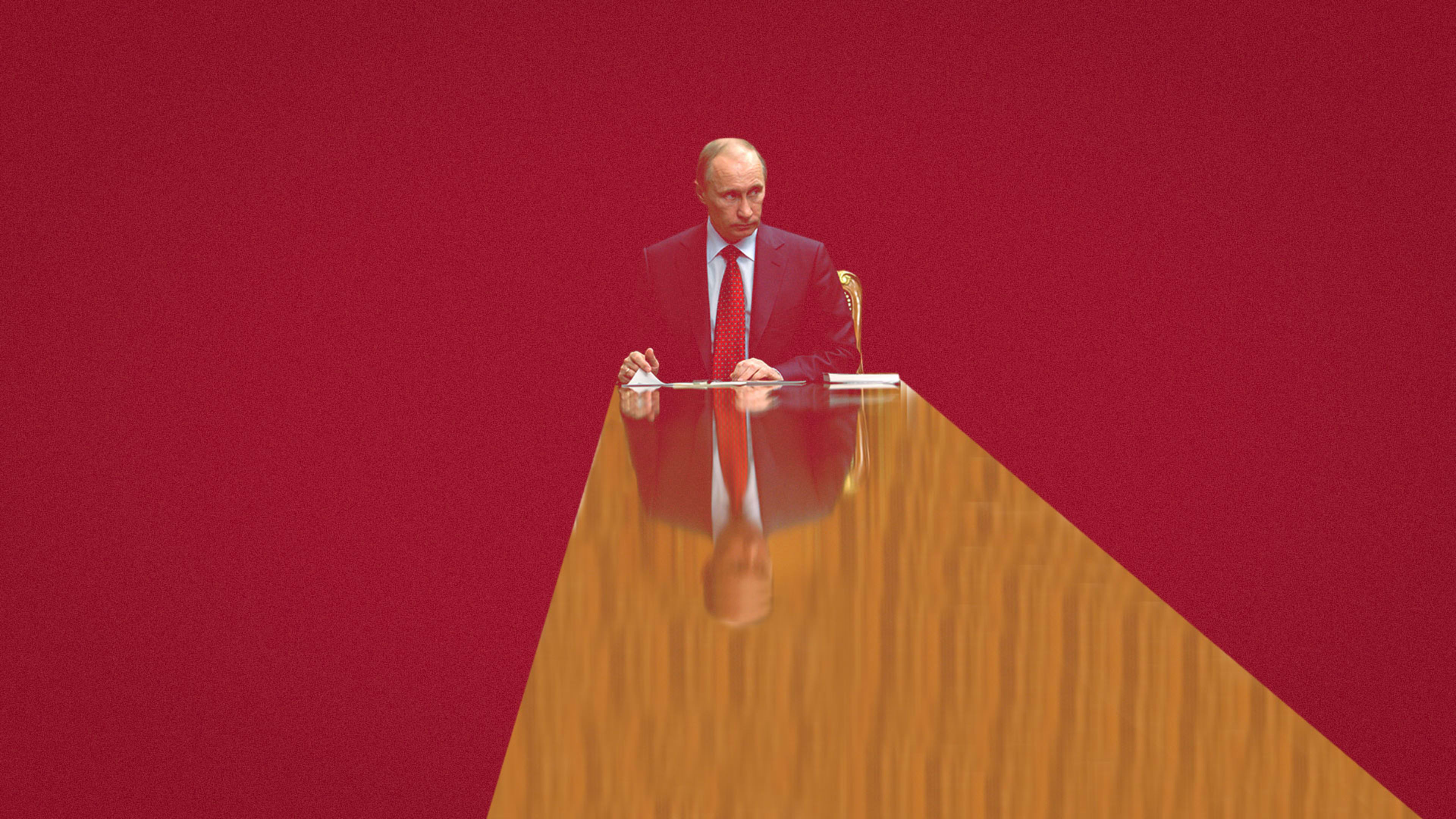The Russian invasion of Ukraine has quickly snowballed into one of the great calamities of the 21st century, sure to have unforeseen consequences for years to come. And yet, in the midst of the death, destruction, and geopolitical turmoil, the memes continue.
Perhaps this is not as nonsensical as it sounds; perhaps even in such a dispiriting moment, online silliness has a role to play.
Consider Vladimir Putin’s absurdly ginormous meeting tables. The Internet has certainly considered them, and found them eminently mock-able—in ways that make a point that transcends a mere punchline.
You may have encountered this meme if you’re a news-and-social-media junkie, but it has steadily gained steam over the brief history of the Russian attack. The long and the short of it—well, mostly the long—is that Putin has a propensity for holding meetings with top flunkies and world leaders at immense tables, always planting himself alone at one end. On their own, each of these images is mystifying: Why would Putin allow the circulation of these weird scenes that look like a cross between an Austin Powers scene and Dr. Strangelove reboot?
But he did allow their circulation, and as they accumulated this unlikely object became a fixation. Even before the actual invasion, pictures of Putin sitting across a big, white table for meetings with French president Emmanuel Macron and German chancellor Olaf Scholz, were reworked into jokes:
Will Putin and Macron do face painting after? #Ukraine #pointless #lipservice pic.twitter.com/hi9agrWzmZ
— Tarquin 🇺🇦 (@Tarquin_Helmet) February 7, 2022
Summary of today's Putin – Macron meeting 😅 pic.twitter.com/dri5O4Mv6F
— Abdylvehab (@abdylvehab) February 7, 2022
The table itself became news. “The table top was made from a single sheet of beech wood, supported on three hollowed wooden stands,” Reuters reported. “It is lacquered white and is gold-plated on the side.”
Remarkably, images of Putin at a different humongous table, again all by his lonesome at one end, with everyone else clumped at the other, also emerged. (This table is made of mahogany, according to NBC News.) And, again, these images were memed.
A Putin le gustan las mesas grandes, eso es así pic.twitter.com/OWa6OrQA3q
— 𝑀𝑎𝑟𝑖𝑎 𝑆𝑎ℎ𝑢𝑞𝑢𝑖𝑙𝑙𝑜 (@mrsahuquillo) February 14, 2022
The meme eventually turned a corner—for example merging with the infamous shirtless Putin on a “long horse“—but stayed rooted in the tangible, physical object. Surely the apotheosis, in fact, was the imagined conversion of the ridiculous table into mass-produced item: Ikea furniture.
https://twitter.com/KristianHarstad/status/1493320966142844934
All of this may seem like a mere escapist distraction from grim world events, and for some that’s probably part of it. But this viral mockery is something more. Parallel to the brutal armed conflict happening on the ground in Ukraine, and a burgeoning economic war playing out almost globally, there’s a distinctly 21st century information war underway, too. Putin, the former KGB officer, knows quite well the importance of controlling the narrative, and undermining the reputations and credibility of rivals.
It’s remarkable, then, how poorly Russia has fared in this information war. That’s partly because of the media savvy—and guts—of Ukrainian president Volodymyr Zelensky, and partly because the brute facts are so awful and impossible to contain. (In real life, Ikea is one of many multinationals that has closed its Russia stores.) Official or semi-official Ukrainian information warfare has played a role, too — from propagandistic myth-making campaigns involving (dubious-to-questionable) stories of a ghostly fighter pilot or a defiant border guard, to distributing macabre images of the invasion’s human cost.
But the global peanut gallery of meme-makers have, however informally, joined this effort, conducting what amounts to grass-roots, bottom-up information warfare on their own. Think of it as the people’s propaganda. Performing visual shenanigans with these absurd pieces of furniture makes a completely sincere point: This man is not a great leader, he is a paranoid and isolated one, out of touch and possibly nuts. He looks like a fool.
And the damage that causes is no joke. Russia is suffering a “public-relations catastrophe,” New York Times opinion columnist Farhad Manjoo wrote recently, and there’s little question whose fault that is; in fact, Manjoo wondered if this moment is “perhaps the unraveling of the myth of Putin’s mastery over global discourse.”
Did a bunch of big-table memes accomplish that? Of course not. But they stand as evidence that Putin’s reputation has changed, his status undermined, probably permanently. The people’s propaganda only works—only spreads—if it rings true. And satirical as it may be, the absurd table-for-one version of Putin has become depressingly convincing.
Recognize your brand’s excellence by applying to this year’s Brands That Matter Awards before the early-rate deadline, May 3.
